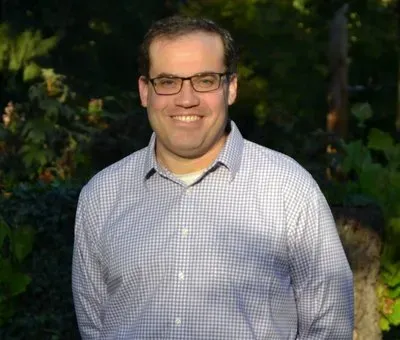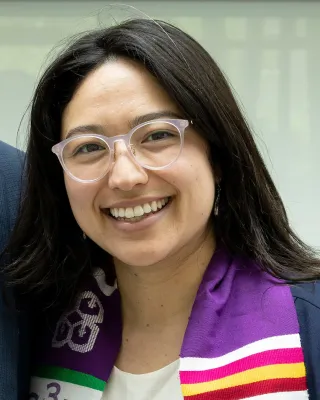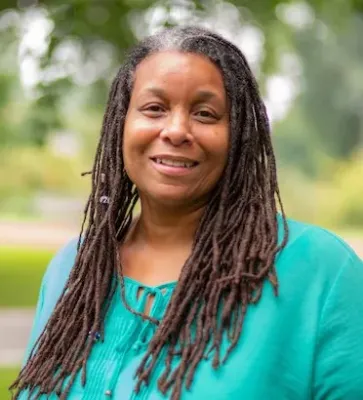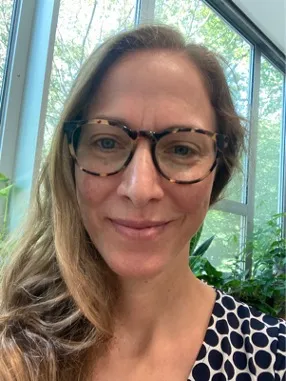
Ben Geller '01
I grew up in rural Pennsylvania, a child of parents from New York City who left to raise a family in a small town. I was and am a passionate sports fan, whose favorite teams always let me down but never stop me from believing the next year will be different. My dad is a lawyer who spent his entire career working for Legal Services, providing voice and representation to low income folks and those who are most vulnerable. Those values were instilled in me from an early age and now inform my teaching and research. I am a Swarthmore alum, having graduated from the college with a degree in Chemistry in 2001.
As an undergraduate I was fascinated by almost every subject I studied and felt like they were all connected. I wrote a paper about the similarities between quantum mechanics and Buddhist philosophy, and another exploring what genetics had to say about ethics. Picking a major was a challenge and I changed my mind a few times along the way. After college I did a master’s degree in the Philosophy of Physics at Columbia University, spent a year as a Fulbright Scholar in the U.K, and ultimately pursued and obtained a Ph.D. in Physics. It’s been a winding path, but the strand that runs through all of it is the liberal arts commitment to seeing the natural sciences and humanities as deeply connected. I do Physics Education Research, a field of study that explores all aspects of how students learn science, and physics in particular. I’m interested in how not just thoughts and ideas, but also attitudes and emotions, play such an important role in how we learn math and science. It is also research that directly informs my teaching. I am continually trying to make my classroom a more interactive and engaging space in which all students can learn deeply. I’m excited to share some of my experiences and learn from everyone involved in the Summer Scholars Program!
Ben Geller ’01
Kyra Harvey-Broughton '19
As a Swarthmore student from a low-income background, I had first-hand experience with some of the challenges that under-resourced students face as they transition to Swarthmore's rigorous academic environment. In S3P, I share my own experience pursuing a STEM major at Swarthmore while battling imposter syndrome. As an antidote to overwhelm, I work to familiarize Scholars with the plethora of resources available to them as Swarthmore students, and I encourage them to regularly and persistently seek help. My hope is that scholars finish our program with a sense of belonging in community and a strong network of support that will last throughout and beyond their time in college.

Karen Henry '87
When I came to Swarthmore, I felt like I didn't fit. I struggled here, mainly because my Philadelphia high school hadn't prepared me for the challenge. What saved me was the mentoring I got from faculty and staff. All of them helped me not just to survive but to thrive at Swarthmore.
When I returned to work in the Student Affairs Division, I determined to make sure to provide this same kind of mentoring and support. A lot of students come into my office and describe what a different experience Swarthmore is for them. I share with them my experience and assure them they will survive. I encourage them to use faculty office hours and to speak up in discussion-based classes—two things first-gen students struggle with. I tell them that this is their chance to take advantage of the great resources Swarthmore has to offer—summer research funding, internships, career services, and programs such as the Richard Rubin Scholar Mentoring Program. This helps first-gen students navigate not only Swarthmore, but life after.
Karen Henry ’87
Kathryn Riley '10
I grew up in a small community in southern Delaware as the child of two public-school teachers. My parents instilled in me a love for learning, both in the structure and support they gave me to complete my schoolwork and in the way they engaged me in learning outside of the classroom. My father’s response to most of my questions was encouragement to go “look it up” in the dictionary or some other text on the bookshelf. My childhood was also highlighted by opportunities to engage the natural world around me, whether it was playing outside, enjoying the Delaware coastline, or gardening with my parents. All these experiences ultimately led me to pursue a career in chemistry research and education.
My time as an undergraduate student at Swarthmore significantly expanded my worldview and vision for my future. My initial semesters at Swarthmore were incredibly challenging. Although I had a strong public-school education, I had not developed the study skills I needed to truly succeed at Swarthmore, I did not know how to access resources like office hours and help sessions, I often felt “behind” in my classes, and I frequently wondered if I was really meant to be at Swarthmore. Thanks to the close mentorship of several faculty members, I eventually found my footing in the curriculum and I truly began to thrive. Now, as a faculty member, I have the privilege of forming strong mentoring relationships with Swarthmore students and helping them succeed in their academic and personal journeys. It truly is the best part of my job and I look forward to building those relationships with the Swarthmore Summer Scholars!
In my personal time, I am an assistant coach for our varsity softball team, I play in an adult slowpitch softball league, and I am a board member and volunteer of a nonprofit organization called Change Up Sports, which is a youth development program that serves marginalized communities. I also enjoy participating in Swarthmore’s vibrant community and you will often see me around campus attending a concert, panel discussion, or sporting event.
Kathryn Riley '10
Allison Miller
I grew up outside Washington, DC as the oldest of five kids. I wanted to be a teacher from a pretty young age, and when I started college I was torn between becoming either an elementary school teacher or a high school math teacher. Over my time at Pomona College, a small liberal arts college in southern California that is a lot like Swarthmore, I had wonderful professors who encouraged me to continue deeper into mathematics and eventually pursue a doctoral degree.
Here at Swarthmore, I do research in topology, a branch of mathematics studying the properties of flexible shapes and spaces. I teach math classes at all levels of the curriculum, and one of my pedagogical focuses is on ethics in mathematics and connections of mathematics to social justice. On a personal level, I have a dog Jamie, a miniature schnauzer mix who loves sniffing, squeaky toys, and coming to campus for office hours and department events.
One of the things I love most about mathematics is its breadth: some people study math because they find it intrinsically beautiful, while others use math as a powerful tool to understand topics in biology, chemistry, economics, engineering, neuroscience, physics, statistics and more. I look forward to exploring both of these perspectives this summer!
Allison Miller
Laura Dandridge
As a former high school math teacher, a large part of my role at Swarthmore is helping students make the transition from high school math to college math as smoothly as possible. I believe learning math is really about making connections. Connections to the web of prior knowledge and life experiences that already exist within our brains, connections with other mathematicians who are productively struggling with the same problem, and connections between math and other academic disciplines will all help to make learning durable and meaningful. Often the transition to higher-level math can involve “unlearning” as well, as memorizing formulas and procedures will not be enough for the challenges ahead. I encourage students to let go of the idea that you’re either a “math person” or you’re not; rather, all people can grow to use the tools of mathematics to solve problems.
In addition to assisting with the math program in S3P, I also teach a PreCalculus workshop attached to Math 15 (Calculus 1) for students who need further support in their transition. I coordinate the Math/stat department’s peer assistants, tutors, and graders. I encourage all students taking a math class to build time into their weekly schedule to seek support and collaborate with other students on the homework. I also encourage students to find balance and make time for non-academic activities they enjoy. When I’m not helping students with math, you may find me running on the track, swimming in the pool, working out in the Matchbox, meandering along the Ockanickon (native name for Crum) or Wissahickon creeks, or playing with my dogs.

Sibelan Forrester
I grew up in Boulder, Colorado, with three younger siblings. My mother was an immigrant, not a citizen when I was born. After my dad left (with us aged 7, 4, 2 and 0), I switched from Catholic school to the local public school; my mother ran a day care in our house to support us. That made it easy for me to get babysitting jobs with those kids, or kids of their parents’ friends. But I had to babysit for my sisters and brother for free (what was my mother supposed to do?). I was good at school, and going away to college looked like my way out.
It was a bit of a shock to find myself in college (at Bryn Mawr!) with some very well-off fellow students – they didn’t just go skiing, like richer kids back home, but went on Caribbean cruises for spring break. I offended a very nice classmate one fall when she said wouldn’t be seeing me in class: she had studied intensive Russian at Middlebury over the summer, while I’d been working a tedious summer job to make my component of the financial aid award. “Must be nice,” I groused…
I went to graduate school at Indiana University, found my first teaching job at Oberlin College, then moved to Swarthmore in 1994 (!). I teach Russian language every year, and I imagine that first year language lets every student feel the incapacity that immigrants have always felt, or that indigenous people felt when colonizers move in and expect them to learn their language. I also teach courses in literature in translation, in translation theory and practice, and in folklore, plus seminars taught in Russian. I hope that my being not a native speaker models possibility for students who start a new language at 18 years old, as I did. I love teaching that involves writing because writing is a magic technology that lets you leap over time and space, expressing your own ideas and reading other people’s, and because it makes its way in everywhere in college life.
Sibelan Forrester
Michael Wilson Becerril
I believe that education is liberation. Classrooms can be paradise, transformative spaces, and seedbeds for collective healing and liberation. Likewise, I agree with bell hooks, Linda Tuhiwai Smith, and others who have said that writing and theorizing can be a practice of freedom. Through them, we can come to better understand ourselves, how society works and why, how history has shaped our families, and what our roles could be in the world. These are sites where we can reframe debates, name injustices, challenge the status quo, bring communities together, and even transform power structures.
I wouldn’t be here if it weren’t for the transformative power of education. As a first-generation, low-income (FLI), Mexican immigrant, English-as-a-second-language speaker, and someone who became independent of my parents at age 16, I have only ever made it through life thanks to the advice of caring and sharp mentors. I am profoundly committed to paying forward their generosity and support. Furthermore, thanks to my own non-traditional background and experiences, I understand and empathize with students’ different backgrounds, learning needs, perspectives of education, and conceptual frameworks. Classrooms should intentionally encourage this plurality, help us build community, and become places where we practice emancipation.
Michael Wilson BecerrilSummer of 2025 Faculty
Dawn Carone, Associate Professor of Biology
Alba Newmann Holmes, Assistant Professor of English Literature, Director of the Writing Associates Program
Lette Bragg, Visiting Assistant Professor of English Literature
Ralph Gomez, Associate Professor of Mathematics
Summer of 2024 Faculty
David Cohen, Professor of Astronomy
Alba Newmann Holmes, Assistant Professor of English Literature, Director of the Writing Associates Program
Joseph Towles, Associate Professor of Engineering
Summer of 2023 Faculty
Cheryl Grood, Professor of Mathematics and Statistics
Sibelan Forrester, Professor of Russian, Russian Section Head
Lisa Meeden, Professor of Computer Science
Summer of 2022 Faculty
Joseph Derrick Nelson, Associate Professor of Educational and Black Studies
Philip Everson, Professor of Mathematics and Statistics
Carr Everbach, Professor of Engineering and Environmental Studies
Summer of 2021 Faculty
Tim Burke, Professor of History
Ben Geller, Associate Professor of Physics
Bradley Davidson, Professor of Biology
Summer of 2020 Faculty
Betsy Bolton, Professor of English Literature
Ralph Gomez, Associate Professor of Mathematics and Statistics
Kathleen Howard, Professor of Chemistry and Biochemistry
Summer of 2019 Faculty
Peter Schmidt, Professor of English Literature
Philip Everson, Professor of Mathematics and Statistics
Matt Zucker, Associate Professor of Engineering
Summer of 2018 Faculty
Peter Schmidt, Professor of English Literature
Philip Everson, Professor of Mathematics and Statistics
Lisa Meeden, Professor of Computer Science
Summer of 2017 Faculty
Anthony Foy, Associate Professor of English Literature
Deb Bergstrand, Professor Emeritus of Mathematics and Statistics
Catherine Crouch, Associate Professor of Physics
David Cohen, Professor of Astronomy
Summer of 2016 Faculty
Anthony Foy, Associate Professor of English Literature
Deb Bergstrand, Professor Emeritus of Mathematics and Statistics
Catherine Crouch, Associate Professor of Physics
Frank Moscatelli, Professor Emeritus of Physics
Summer of 2015 Faculty
Jill Gladstein, Associate Professor of English
Cheryl Grood, Professor of Mathematics
Amy Cheng Vollmer, Professor Emerita of Biology



